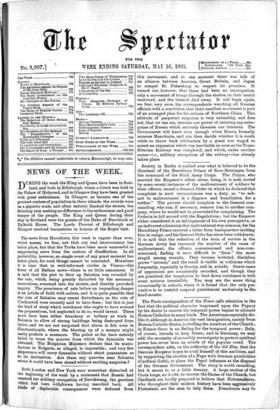The Paris correspondent of the Times calls attention to the
fact that the political character impressed upon the Papacy by the desire to recover the temporal power begins to alienate Roman Catholics in many lands. The Americans especially dis- like it, although in America the vast immigration, mainly from Roman Catholic States, is swelling the numbers of the Church ; in France there is no feeling for the temporal power ; Italy, of course, intends to keep Rome ; and in Germany, we may add, the necessity of an earthly sovereignty to protect spiritual power has never been an article of the popular creed. The correspondent adds, on the authority of the Gil Blas, that the German Emperor hopes to avail himself of this ambition, and by supporting the election of a Pope with German proclivities (Cardinal Gotti), to place the Papal influence at the disposal of the German Government. The story is worth recording, but it seems to us a little dreamy. A large section of the Curia longs, no doubt, to recover the States of the Church, but Cardinals are hardly prepared to believe that Hohenzollerns, who throughout their modern history have been aggressively Protestant, are the men to help them. Frenchmen may be inclined to credit the tale, because it tends to sow distrust between the members of the Triple Alliance, but Englishmen, whether Protestant or Roman Catholic), will -do well to wait for further confirmation. William IL would, we dare say, like Roman Catholic support in proclaiming himself heir of the Western Empire and the true and only Kaiser, but he will hardly pay the necessary price for that supreme dignity, and thereby impair even the stubborn loyalty of the old followers of his house.











































 Previous page
Previous page